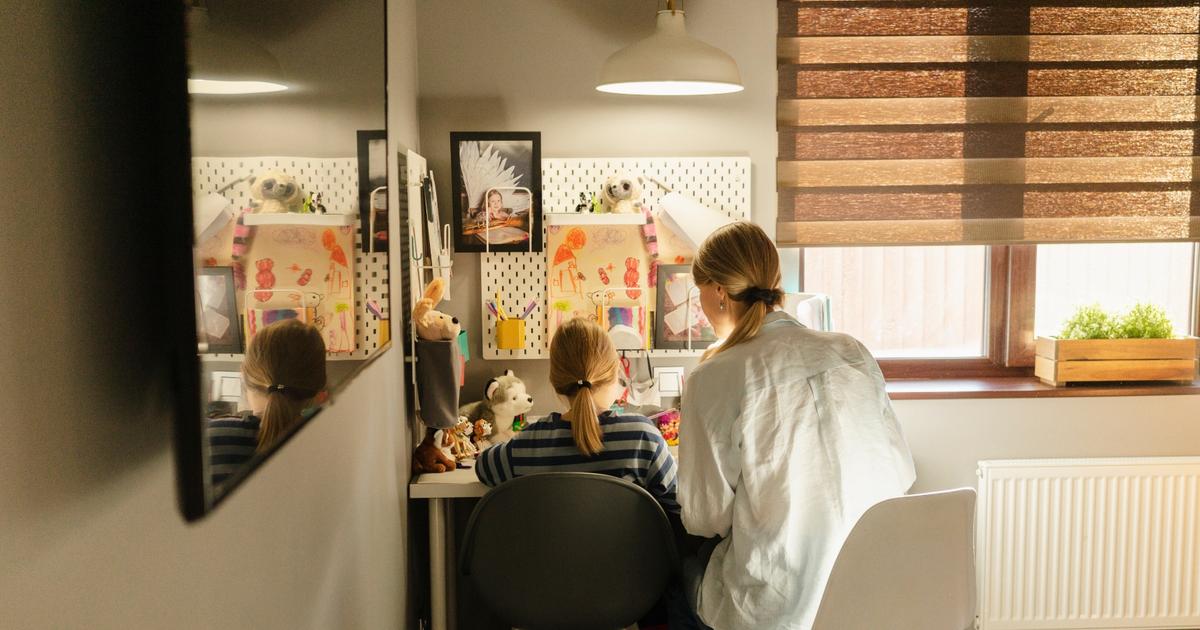Office fan:
Amazon founder and Corona winner
Jeff Bezos
in a glass dome of the "Amazon Spheres" in downtown Seattle
Photo: AP
The Ifo Institute estimates that around 56 percent of jobs in Germany could also be done from home.
In the Corona crisis, the home office became a reality for more people than ever before: Around 30 percent of employees worked at least partially in the home office in February.
That is now changing again.
The further the infection numbers fall and the vaccination rate increases, the more people return to the office desks.
At the end of June, the German Corona Occupational Health and Safety Ordinance is expected to expire, which prescribes home office everywhere "where it is possible".
What have the companies learned from this?
Will the trend continue?
In any case, the ratings of the top managers are quite diverse.
If you look at their statements, you have an inkling: In the future, the differences will probably not only be visible according to industries, but are primarily a question of corporate culture.
Goldman Sachs: Home office as wrong way
Goldman Sachs boss
David Solomon
found clear words about working from home at a bank conference in February: This is by no means the new normal, but rather "a wrong path that we will correct as soon as possible".
For an "innovative, collaborative culture" like Goldman, physical distance is simply not ideal.
Mind you: At the time, Solomon said the investment bank still had fewer than a tenth of its employees called back to offices worldwide.
In New York it was already a quarter, in Asia it was now more than half.
Wherever the pandemic subsides, Goldman takes the chance to return.
Netflix: "Purely negative"
Netflix boss:
Reed Hastings
Photo: LLUIS GENE / AFP
The attitude of
Reed Hastings
(60), the head of Netflix
, could be even more surprising
.
After all, hardly any other company benefits as much as the streaming service from the fact that so many people stay at home permanently.
For its own work, however, Hastings judged the "Wall Street Journal" that it was "purely negative, not being able to meet personally, especially internationally".
He couldn't think of a single advantage.
Amazon: "Office-Centered Culture"
The biggest corona winner is certainly Amazon.
Founder
Jeff Bezos'
fortune
(57) rose in the crisis from 114 to 188 billion dollars. The number of employees at the ecommerce and cloud giant grew by half a million to 1.3 million in 2020. Most of them work in logistics centers or as couriers; home office was never an option for them anyway. But the offices with 70,000 employees in Seattle alone should fill up again as quickly as possible. "Our plan is to return to an office-centered culture as a base," Amazon told employees at the end of March. Most US office workers are expected to be back at work by the beginning of autumn. It could take a little longer in Europe, but only because of Corona. The offices have never been completely closed, emphasizes Amazon. The new boss
Andy Jassy
(53) complained about digital meetings on the CNBC television station: "You just don't riff the same way", loosely translated: A team just doesn't rock together so well if they're not all in one room.
Microsoft: Less than 50 percent
Enlarge image
Microsoft boss:
Satya Nadella
Photo: REUTERS
Microsoft boss
Satya Nadella
(53)
also expressed unease
: Without a clear separation between work and private life, "it sometimes feels like you're sleeping at work".
Nevertheless, like most of the companies, the company is working on a hybrid model, a mixture of office and home office.
The aim is to introduce the home office as the standard for most jobs, but only "part-time (less than 50 percent)".
Porsche: "We don't care about a holiday home or a café"
Porsche shows that industrial companies can also use mobile working, at least for their desk workers. On May 1, a works agreement came into force at the Volkswagen subsidiary, with the help of which the employees should be given flexibility. "It is important to us that we have highly motivated employees," said
Andreas Haffner
, Chief Human Resources
Officer,
in the "Frankfurter Allgemeine Zeitung". Everyone can work up to twelve days a month, when, where and how they want, as long as the work results are right. Whether "in the holiday home in Upper Bavaria or in the café next door, that ultimately doesn't matter to us". For Porsche, this has a nice side effect: save costs. In 2025, Porsche only wants to have desks for 60 percent of office employees.
Deutsche Bank: Flexibility between 40 and 60 percent
Enlarge image
Chief Financial Officer of Deutsche Bank:
James von Moltke
Photo: ARMANDO BABANI / EPA-EFE / REX
Deutsche Bank is planning a model in which employees can work from home on a daily basis of their own choosing, but communicate this through their superiors. "We believe that the flexibility is between 40 and 60 percent," said CFO
James von Moltke
(52) of the Bloomberg news agency. The in-house economists have published an analysis paper entitled "Home office - come to stay", which also dampens the expectations of the "first home office euphoria" - the office property market, for example, does not have to fear any major losses. One of the first euphorics was bank manager
Christian Sewing
(51), who asked at the Annual General Meeting in May 2020: "If our bank can still be excellent for our customers, do we still need that much office space in expensive metropolises?"
In the meantime, bank research also caused a sensation with the idea of a home office tax for social compensation, but there is no longer any talk of that.
Allianz: No fixed quota
Allianz boss:
Oliver Bäte
Photo: Andreas Gebert / dpa
Allianz has had its "New Work Model" since the beginning of the year.
CEO
Oliver Bäte
(56) had known after the first wave of Corona that he himself felt "sometimes significantly more productive" without the distraction in the office.
In July 2020 he wanted to permanently save a third of the office space and even half of the travel costs ("We don't need all these trips any more").
In contrast, HR manager
Renate Wagner
(46)
emphasized
that the insurance company is not committed to a rigid home office quota or savings targets for office space.
The focus is on the needs of the employees, the superiors must "also be able to let go".
Google: Expected life within reach of the office
The example of Google was often used as a pioneer for the home office in the pandemic.
The Internet company set home office as the standard for everyone, gave generous subsidies for setting up home workplaces and continued to extend the deadline for returning to the office.
Now the new HR manager
Fiona Cicconi set
September 1st as the
key
date for the approximately 130,000 employees - but only for home office without consultation.
If you want to work from home for more than 14 days after that, you have to apply for it.
The company also expects its employees to "live within commuting distance of offices".
Facebook: Free choice of location - possibly with wage deduction
Enlarge image
Facebook boss:
Mark Zuckerberg
Photo: LLUIS GENE / AFP
Facebook boss
Mark Zuckerberg
(37) said he expected that in the next five to ten years half of employees would choose their place of work freely. The company is just beginning to reopen its Silicon Valley offices. "Mobile working is the future," said HR manager
Brynn Harrington of
the BBC, but admitted that she was still looking for a healthy proportion of workplaces. The forced home office under pandemic conditions should not be seen as a model. Basically, the employees should decide for themselves, including where they want to settle. However, "we pay according to local labor costs," Harrington clarified. Moving to the Maldives for a Silicon Valley wage is probably not an option.
Spotify: "Work From Anywhere"
The music streaming service Spotify christened its new set of rules "Working From Anywhere" in February.
All employees should decide flexibly together with their superiors on the right mix of home and office work, if necessary the company will also pay the rent for a coworking space.
Theoretically, Spotify employees could settle anywhere in the world, but they have to commit to a time zone that is also suitable for communicating with their colleagues.
Twitter: Home office forever, for some
A true home office fan is Twitter boss
Jack Dorsey
(44), who announced in May 2020 that employees could work from home forever if they so wished.
He himself had already booked a long time in the home office as an aha experience in 2018: a lot goes much better outside of the office.
After the big announcement, however, the company restricted that it depends on the situation and the specific role of the employees whether they can really make that free decision.
Twitter expects the majority to continue to show presence in the office at least from time to time.
Shopify: Headquarters cleared
Shopify boss
Tobias Lütke
(40) wrote last spring that his company was now "digital by default",
i.e.
digital by default.
At first, this is not surprising with an e-commerce platform, but the strategy is quite the opposite of that of its industry colleague Amazon.
He announced that most employees should work permanently on the move.
"The office-centeredness is over," explained Lütke.
And he acted: The existing offices were completely cleared for renovation in order to adapt to the new way of working.
In September, it was reported that Shopify was leaving its headquarters in the Canadian capital, Ottawa.
ak








